Cost of living crisis: 'Places like this shouldn't exist these days'
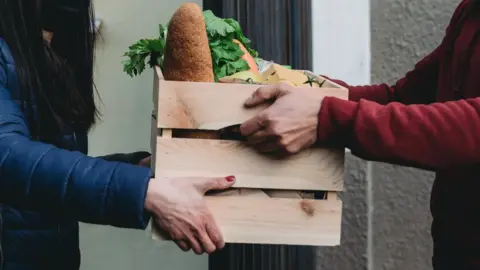 Getty Images
Getty ImagesFigures released by the Trussell Trust this week show that almost 224,000 food parcels were given out in the East of England over the last year - a rise of 17% since the start of the pandemic. But for one charity in Bedfordshire, families in crisis are turning to them for more than food handouts.
"It says an awful lot about society that we're having to pick up the pieces for this crisis," says June Tobin, who volunteers with the Leighton Linslade Helpers.
"People like us and places like this really shouldn't exist in this day and age."
June says the charity is also called on to help people access supermarket vouchers, replacement phones and top-up credit - even fuel for the car.
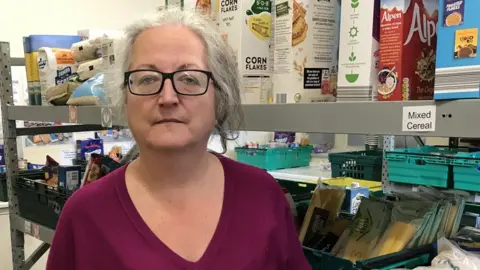
"We started by responding to the emergency at the beginning of the pandemic and thought demand would go away once we came out of the measures - but it's actually increased," she says.
"During lockdown we sent out 40 to 60 food parcels a week. Now we're talking 120 food parcels a week.
"We have elderly people who are too afraid to put their heating on so they're not cooking hot meals. We have families who have no savings but are working - if the washing machine breaks they can't afford a new one.
"But it's not just food parcels anymore. We have people coming to us in crisis because they can't put credit on their phones and they need that to search for work. Some people can't afford to put petrol in their car so we will try and help them with that because if they don't get to work they can't pay their bills.
"People are struggling in real work poverty. They're working but not actually making ends meet."
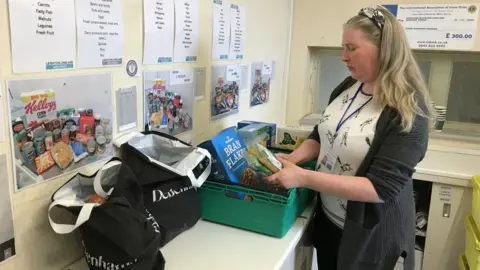

'It helps with the purse strings'
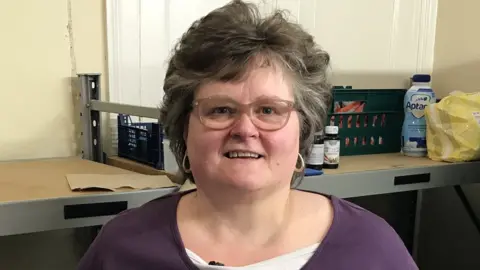
Volunteer Chris Lockett is sorting fruit and vegetables that have come in from supermarkets that morning, and is stocking up the charity's community fridge - which is accessible to everyone who needs it.
To Chris, not a single crumb goes to waste.
"We've saved somewhere in the region of 71,000 meals from going into landfill since we opened in October," she says.
"With the situation we find ourselves in at the moment it also helps with the purse strings.
"We've got clients who come in here now that are really delighted at the environmental side of things but they're also finding the financial benefits of using us too."
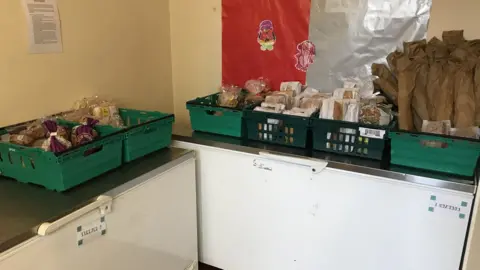

'People are struggling'

Robert Bellis, who is on benefits, cares for his wife, who was diagnosed with cancer last March.
He accesses the Leighton Linslade community fridge "now and again" - but also tries to donate back when he can.
"I used to put £30 on my electric for two weeks and now it's not even lasting four days," he says.
"Everything's gone up in the shops. The cost of shopping alone is making it harder for people who don't work, but care for others.
"We're struggling now, even with the food parcels, when you're on a budget for two weeks and you're on a limited income, it's really difficult to make ends meet.
"A lot of people are in the same position. The cost of living has gone up and people are struggling.
"I've seen it go from a few people outside the fridge to five or six, maybe 10 people in the queue. It's not just single people or couples, but families."

'The edge is closer than it's ever been'
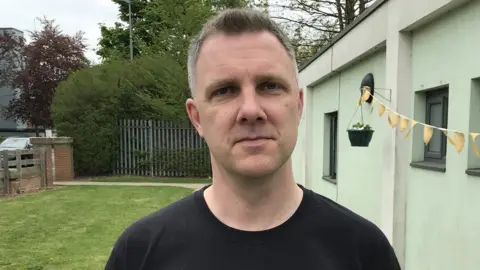
In Milton Keynes, another charity called St Mark's Meals delivers meal kits to families worried about feeding their children.
They've seen demand rise by 25% this year alone - but a 27% increase in costs for families.
Many of the kits - which provide a bolognaise or curry ingredients, for example - are handed out at schools.
"We're aware that there are lots of children who maybe get a free school breakfast and lunch and then there's nothing at home for dinner," he says.
"Everybody's experiencing the squeeze. There's much less margin for anybody. So many things can just tip somebody over the edge.
"The edge is closer than it's ever been.
"A child who's hungry is going to struggle at school. If a child is hungry in primary school they leave two years behind their peers - just because they were hungry. They leave secondary school five years behind their peers, just because they're hungry.
"Children can't affect the amount of food in the cupboards, they can't change what their parents are able to do, like putting more money on the meter.
"The child is always the recipient of some of the worst aspects of poverty."
If you're in financial crisis and live in England or Wales, please call 0808 2082138 for free (open Monday to Friday 09:00-17:00) to talk confidentially to a trained Citizens Advice adviser about food banks in your area.

Find BBC News: East of England on Facebook, Instagram and Twitter. If you have a story suggestion email [email protected]
